Tom Brady as an underdog in a Super Bowl. It’s something that actually happened in the recently-retired quarterback’s second season. The seven-time Super Bowl champion was then on the receiving end of one of the greatest upsets in championship game history.
As the Kansas City Chiefs and Philadelphia Eagles prepare for Super Bowl LVII, we know this game is relatively even on paper. No one is going to pull off a major upset.
Even then, we also thought it made sense to look at the five of the biggest upsets in Super Bowl history. Check it out below.
Related: Top storylines for Super Bowl LVII
5. Super Bowl XXXII: Denver Broncos take out Green Bay Packers
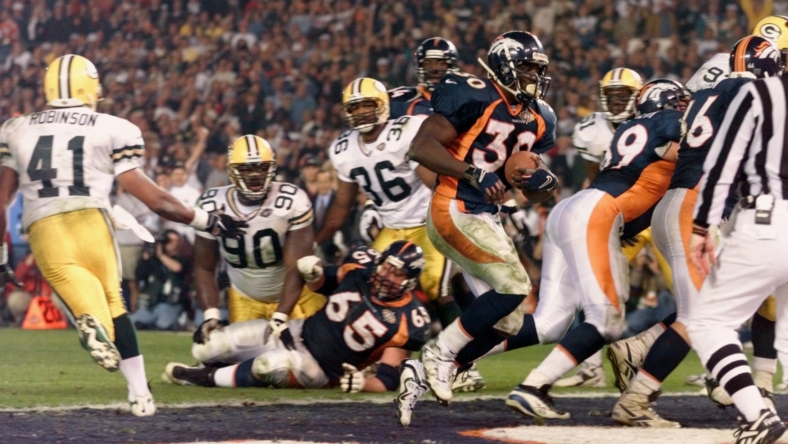
- Super Bowl XXXII point spread: Packers (-11.0)
- Final sccore: Broncos 31, Packers 24
After seeing his Denver Broncos lose in the Super Bowl three separate times earlier in his career, veteran quarterback John Elway wanted to at least win one before calling it quits. After all, his three previous losses in the big game came by a combined 96 points.
Denver finished the 1997 season with a 12-4 record. It boasted the top-scoring offense in the NFL and outscored its opponents by nearly 12 points per game. For the oddsmakers, this didn’t matter. Led by co-NFL MVP Brett Favre, the defending Super Bowl champion Green Bay Packers were 11-point favorites heading in.
After a back-and-forth affair inside Qualcomm Stadium in San Diego, a Terrell Davis one-yard touchdown with under two minutes left put Denver up 31-24. The Broncos would hold Green Bay on the final possession of the game after the Packers drove down to Denver 35-yard line.
Davis went on to win Super Bowl MVP with 157 rushing yards and three touchdowns. Elway completed a mere 12-of-22 passes for 123 yards with an interception. He would go on to win the Super Bowl the following season, too, ending his career on a high note.
Related: Bold predictions for Super Bowl LVII
4. Super Bowl IV: Kansas City Chiefs stun Minnesota Vikings
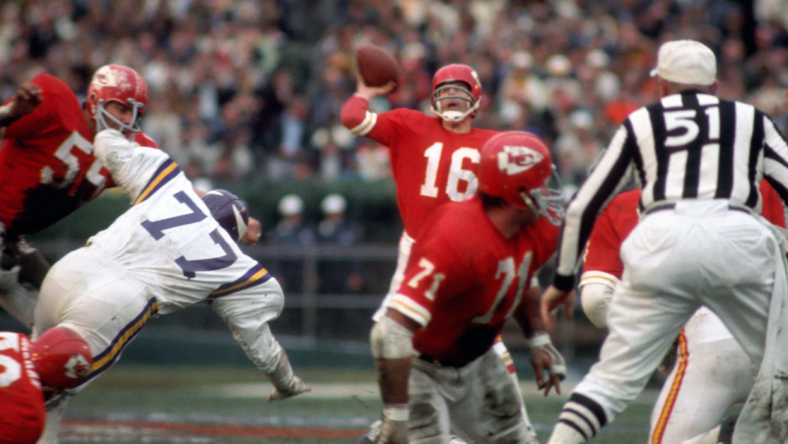
- Super Bowl IV point spread: Vikings (-12.0)
- Final score: Chiefs 23, Vikings 7
Under Bud Grant, the 1969 Vikings were an absolute juggernaut. They won 12 regular-season games, leading the NFL in scoring (27.1 points per game) while yielding the fewest points in the league (9.5 per game). The Purple Peaple Eaters defense absolutely dominated with the likes of future Hall of Famers Carl Eller, Alan Page and Paul Krause leading the charge.
On the other side stood a major underdog from the old AFL, led by head coach Hank Stram and late-great quarterback Len Dawson. Kansas City had lost the first ever Super Bowl to Green Bay a few years prior and wasn’t given much a chance in this one.
About that. Three first-half field goals from the legendary Jan Stenerud gave Kansas City a 9-0 lead as onlookers inside Tulane Stadium were taken aback by the domination. After Mike Garrett scored on a run from five yards out in the second quarter, this one was pretty much over.
Minnesota scored a touchdown on a Dave Osborn run in the third quarter. But Kansas City put it away on a highlight-reel 46-yard touchdown pass from Dawson to the great Otis Taylor.
Vikings quarterback Joe Kapp threw two interceptions in defeat. He would ultimately be replaced under center by former New York Giants quarterback Fran Tarkenton a couple years later. But the results did not change for Bud Grant’s squad. Minnesota lost three more Super Bowls from 1973-76, etching its name in stone as failures on the grandest stages the gridiron world has to offer.
As for Kansas City, it would not hoist the Lombardi again until Patrick Mahomes led the team to a win over the San Francisco 49ers in Super Bowl LIV some half-century later.
3. Super Bowl XXXVI: New England Patriots dynasty begins
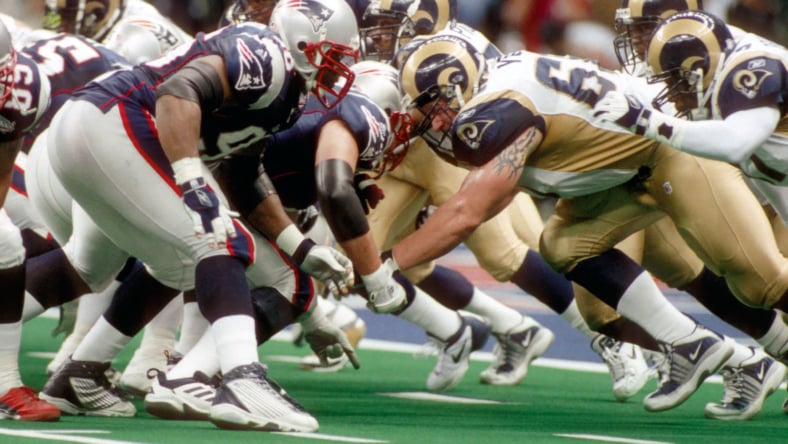
- Super Bowl XXXVI point spread: Rams (-14.0)
- Final score: Patriots 20, Rams 17
By now, this story is known to those who have a rich understanding of NFL history. The 2001 St. Louis Rams, known as the Greatest Show on Turf, were absolutely loaded. They finished the regular season with a 14-2 record, averaging a whopping 31.4 points per game. Quarterback Kurt Warner won league MVP. Running back Marshall Faulk was the Offensive Player of the Year.
Heading into the Super Bowl, Los Angeles was averaging nearly 37 points over its past six games. The team had defeated its two opponents in the NFC Playoffs by a combined 33 points.
On the other side stood a Patriots team that was forced to replace injured franchise quarterback Drew Bledsoe less than two games into the regular season. Taking over for him was an unknown former sixth-round pick in Tom Brady who had thrown all of three regular-season passes as a rookie the prior year.
While Brady did lead New England to 11 wins in his 14 starts, the team had just narrowly defeated the Oakland Raiders and Pittsburgh Steelers in the AFC Playoffs. Everything was set up for St. Louis to head into the Louisiana Superdome and come away with a blowout win.
New England took a 17-3 lead into the fourth quarter, thanks in large part to a 47-yard pick-six from Ty Law of Kurt Warner. St. Louis finally came alive with two fourth-quarter touchdown drives to tie it up with 90 seconds remaining.
That’s when the legend of Tom Terrific was born. Without a single timeout remaining, Patriots head coach Bill Belichick opted to go for the win rather than overtime.
“With a quarterback like Brady, going for the win is not that dangerous, because he’s not going to make a mistake,” Belichick said after the game.
Brady would ultimately lead New England down the field to St. Louis’ 30-yard line, setting up a game-winning field goal from Adam Vinatieri as time expired. A dynasty was born in New England.
2. Super Bowl XLII: Undefeated Patriots go down to Giants
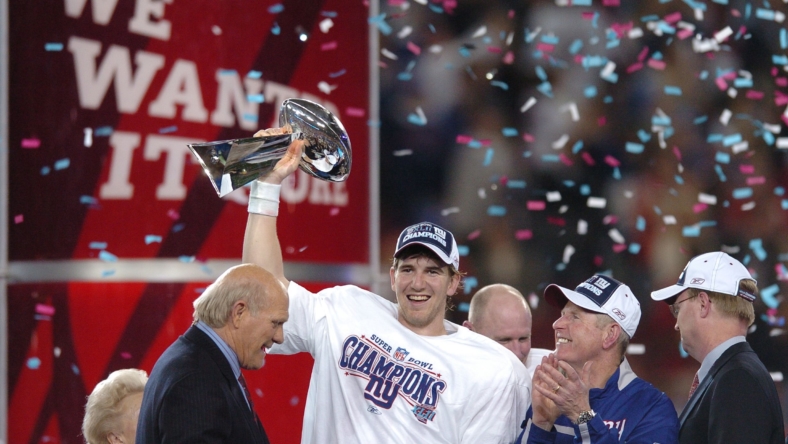
- Super Bowl XLII point spread: Patriots -12.5
- Final score: Giants 17, Patriots 14
Six years after their first Super Bowl win of the dynastic era, the Patriots found themelves as absolute juggernauts. The 2007 regular season saw New England join the 1972 Miami Dolphins as the only undefeated team in NFL history. Led by Brady and Randy Moss on offense, their offense averaged 36.8 points per game. Bil Belichick and Co. had outscored its opponents by an average of 19.7 points per outing.
Brady threw for 4,806 yards with a then-league record 50 touchdown passes. In his first season with the Pats, Moss broke Jerry Rice’s single-season NFL record with 23 touchdown catches.
Standing in New England’s way was a Tom Coughlin-led New York Giants team that had won just 10 regular-season games. New York finished in the middle of the pack in points score and points allowed. It had dropped four of eight to conclude the regular season. Meanwhile, quarterback Eli Manning put up a regular season that saw him lead the league with 20 interceptions.
Despite being overwhelming underdogs heading into this one, there was an internal belief in Jersey that the Giants could hang with New England. After all, they lost by just three points to this very same Patriots team back in Week 17.
This acted as a precursor as Super Bowl XLII kicked off in Arizona. New England found itself up just 7-3 after three quarters as its high-octane offense was stifled by the likes of Michael Strahan and Justin Tuck.
After New York took a 10-7 lead on a Manning touchdown pass to David Tyree with 11:05 remaining in the final stanza, Brady and Moss finally connected. It came on a six-yard touchdown pass with less than three minutes remaining. At this point, it seemed as if New England had avoided one of the biggest upsets in Super Bowl history.
Manning and Co. had other ideas. New York took over at their own 17-yard line with 2:39 remaining in the fourth quarter. Facing a third down to open the drive, Tyree made one of the most-memorable catches in Super Bowl history. He pinned the ball between his right hand and the crown of the helmet for a 32-yard gain.
Later in the drive, Plaxico Burress scored the winning touchdown on a 13-yard pass from Manning with 35 seconds left to put the Giants in the history books. Dolphins players from that ’72 team were popping champagne. The Pats were left wondering what could of been. Unfortunately, the scene would repeat itself four years later with New York again taking out Brady’s Patriots in Super Bowl XLVI.
1. Super Bowl III: New York Jets stun Baltimore Colts
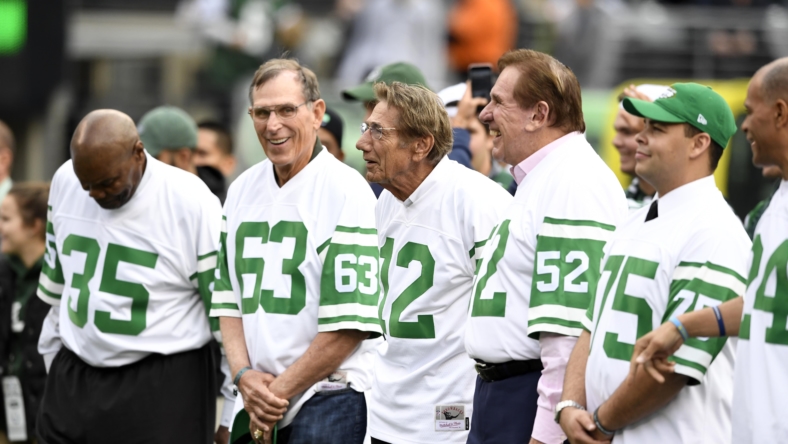
- Point spread: Colts (-18.0)
- Final score: Jets 16, Colts 7
Joe Namath guaranteed that his Jets would make a name for the AFL in a championship game against the heavily favored Baltimore Colts.
Legitimately, no one gave Broadway Joe and Co. a chance in this one. Baltimore finished the regular season with a 13-1 record. It outscored opponents by north of 18 points per game and had just shutout the Cleveland Browns in the NFL Championship Game by the score of 34-0. While the Jets did their thing by posting an 11-3 regular-season record, they were outmanned on the field.
It didn’t matter once Super Bowl III kicked off from the Orange Bowl in Florida. The Jets’ defense forced five Colts turnovers, including three interceptions of Earl Morrall. They took a 16-0 lead on three field goals from Jim Turner and a Matt Snell four-yard touchdown run. Namath won Super Bowl MVP by completing 17-of-28 passes without an interception, etching his name in NFL lore.


